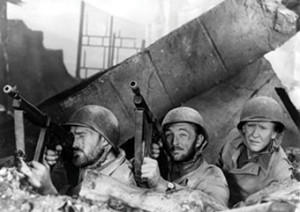 During most of the U.S. involvement in World War II, Hollywood’s war movies tended to be unrealistic action pictures: derring-do with a hefty mix of gung-ho rhetoric. Then, just as things were winding down, as the war was ending in 1945, a remarkable picture was released with a title that seems a bit anachronistic today, The Story of G.I. Joe, directed by William Wellmann. This independent film from United Artists presents the point of view of war correspondent Ernie Pyle (played here by Burgess Meredith) as he follows an infantry company through the North African and Italian campaigns. It’s just a different kind of effort altogether—an attempt to portray the actual experience of war at the level of the ordinary soldier.
During most of the U.S. involvement in World War II, Hollywood’s war movies tended to be unrealistic action pictures: derring-do with a hefty mix of gung-ho rhetoric. Then, just as things were winding down, as the war was ending in 1945, a remarkable picture was released with a title that seems a bit anachronistic today, The Story of G.I. Joe, directed by William Wellmann. This independent film from United Artists presents the point of view of war correspondent Ernie Pyle (played here by Burgess Meredith) as he follows an infantry company through the North African and Italian campaigns. It’s just a different kind of effort altogether—an attempt to portray the actual experience of war at the level of the ordinary soldier.
After an uneven start, in which the film threatens to become just another war movie, it settles into its own remarkable groove. Wellmann doesn’t focus on battles—what brief fight scenes there are have the alarming and chaotic feel of snatches of newsreel. Instead we see the long drudgery of the march, the miseries of encamping in the rain, the small pleasures and conflicts of personal interaction between the soldiers. Death is treated with complete honesty—no dramatics, just the ugly fact. With careful accretion of detail, the movie creates a vivid sense of love between the men in the field, unspoken yet tangible.
Robert Mitchum took full advantage of his chance to break out of B movies, turning in a performance of flawless integrity as the company’s Captain. Never has a warrior been played with less bravado or more soulfulness. Meredith is touchingly genuine as the reporter. Freddie Steele plays a tough sergeant who has received a record of his young son’s voice, but can’t find a phonograph to play it with. This motif, which would have been merely maudlin in lesser hands, gradually progresses through stages of comedy, poignant drama, and grief. Although other aspects of the men’s talk and interactions are sometimes dated by their time period, the tone of respect and the naturalistic style prevent the film from ever losing its dignity. The script continually surprises with its off-hand wit and sober view of life.
It seems to me that The Story of G.I. Joe takes just the right attitude towards the war, or any war considered necessary. While there is no questioning of the justice of the cause, the death of young men is seen as a tragedy, rather than sugarcoated with patriotic glory. That is to say that the film honors the soldiers for the job they did, but doesn’t flinch from showing war in general as a sad, dirty business. This is a difficult and exemplary position for a film to take. It doesn’t glorify war; it tries to show the way it really is. Yet neither does it seek to cheapen the sacrifice of those who fought. The Story of G.I Joe is a natural, moving, wholly admirable piece of work. It’s available on DVD.

